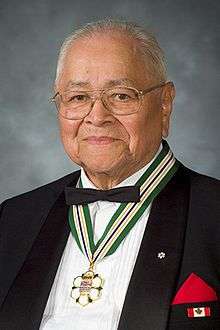Frank Arthur Calder
| Frank Arthur Calder MLA | |
|---|---|
 2004 Order of British Columbia | |
| MLA for Bulkley Valley-Stikine | |
|
In office 1949–1979 | |
| Preceded by | Frank Arthur Calder |
| Succeeded by | Al Passarell |
| Personal details | |
| Born |
August 3, 1915 Nass Harbour, British Columbia |
| Died |
November 4, 2006 (aged 91) Victoria, British Columbia |
| Political party | New Democrat, British Columbia Social Credit Party |
| Spouse(s) | Tamaki Calder |
Frank Arthur Calder, OC OBC (August 3, 1915 – November 4, 2006) was a Nisga'a politician in Canada, the first Status Indian to be elected to any legislature in Canada.
Born in Nass Harbour, British Columbia, Calder was the first Indian to graduate from the Anglican Theological College of the University of British Columbia. Mr. Calder was an hereditary chief of the House of Wisinxbiltkw from the Killerwhale Tribe. He died November 4, 2006 at an assisted-living home in Victoria from the effects of cancer and recent abdominal surgery.
Political career
In the 1949 British Columbia election, Calder was elected to the Legislative Assembly of British Columbia. He was elected in the riding of Atlin where he continued to serve until 1979. Calder represented BC's Co-operative Commonwealth Federation (which later became the New Democratic Party of British Columbia).
Calder was appointed cabinet member in Dave Barrett's government in 1972 and became BC's first aboriginal cabinet minister. In 1973, police found him in a consensual situation involving a female companion, alcohol and a car parked in an intersection. He was arrested but not charged and was fired from cabinet.[1] In 1974 he was defeated by Joseph Gosnell in his bid to be re-elected as president of the Nisga'a Tribal Council.[1]
In 1975, Calder crossed the floor to join the Social Credit Party of British Columbia and was re-elected. In 1979, however, Calder lost his seat to the NDP candidate, Al Passarell, by a single vote.
Fighting for treaty rights
Calder is famous for the court case titled "Calder vs. Attorney General of British Columbia", which was argued by Thomas Berger. By appealing the case all the way to the Supreme Court of Canada, Calder established that Aboriginal title exists in modern Canadian law. This decision had national and international reverberations. In addition, it was the basis of BC's Nisga'a treaty.
Before the Calder Case, there was no clear process for negotiating Canadian land claim settlements. Calder clarified which lands were negotiable (40% of Canada's land mass) and which were not. After the case, Canada developed a land claim policy to guide negotiations. He continued to fight for Nisga'a's treaty rights as recently as 2000.[2]
Calder founded the Nisga'a Tribal Council, the first tribal council established in B.C. Calder was its president for 20 years until 1974.
Honours
- 1987 - Made an Officer of the Order of Canada.
- Awarded the Aboriginal Order of Canada.
- 1996 - National Aboriginal Achievement Award
- 2004 - Awarded the Order of British Columbia.
References
External links
- In memory of Dr. Frank Calder, Chief of Chiefs
- Eulogy from the Diocese of New Westminster web pages
- Introduction by Frank Calder to Nisga'a: People Of The Nass River
- Calder's Order of British Columbia biography
- Calder in the Canadian Encyclopedia
- "History of Land Claims in British Columbia (PDF)" (PDF). (142 KiB)
- Provincial Hansard during debate on circumstances of Calder's firing